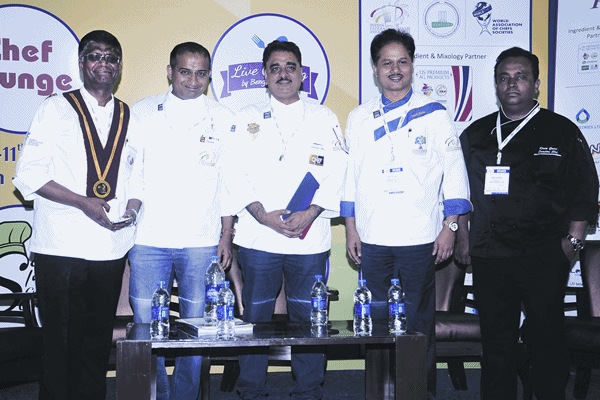In the wake of modernisation of Indian cuisine, fusion trends and changing food preferences; South India Culinary Association’s panel discussion witnessed chefs discussing the boons and banes of progressive Indian cuisine and sharing their suggestions By Mohit Rathod
The recently concluded 28th edition FHW Bengaluru had organised panel discussion by South India Culinary Association (SICA), which witnessed prominent chefs discussing on various aspects of modern Indian cuisine. The panel discussion, themed ‘Is progressive Indian cuisine effective or affective?’, was moderated by Chef Vijay Bhaskaran, vice president, Indian Federation of Culinary Association (IFCA). On the panel were Chef Abhijit Saha, co-founder, director and chef, Caperberry & Fava, Bangalore; Chef Rana Gomes, executive chef, Hotel Royal Orchid, Bengaluru; Chef Vikram Udaygiri, director, Excuisine Food and Beverage; and Chef Jugesh Arora, president, SICA. The panel discussion focused on the evolution of Indian cuisine into progressive Indian cuisine, its effectiveness and setbacks.

Indian cuisine is considered one among the healthiest cuisines in the world. It adopts a balanced combination of various preparations to offer a nutritious diet. “Cookery is an art and a science. Indian cuisine is based on Ayurveda, which promotes health and wellness. For instance, Idli is one of the best meals created, based on science,” said Chef Arora, further suggesting that chemicals should be avoided in Indian cuisine, as they are bad for health and they interfere with the science behind the food.

Fusion and confusion
Over the last few years, chefs feel it is essential to develop cuisines by adding new elements, innovation in order to meet the changing food preferences of the new age consumer. Indians have been travelling the world and exploring cuisines, and various ingredients, which they wish to experiment with Indian cuisine. Chefs, to cater to consumers’ preferences, have to develop Indian cuisine accordingly. Another major reason is the competitive environment of F&B market, which requires chefs constantly deliver innovation through unique dishes. However, during this process involving fusion and experimentation, the originality of Indian cuisine is often compromised with.

Giving his views, Chef Saha said, “Evolution is important for food. We need to understand and respect Indian traditions, whilst embracing the future. Modernisation is the way for Indian food. Three years from now, around 50 per cent of restaurants will serve modern Indian cuisine. Real Indian cuisine is not one concept, it is about every Indian region. We need to take regional cuisines and present them in a modern style.” Adding to that, Chef Arora opined, “As far as Indian cuisine is concerned, each state has a different essence. It is difficult for chefs to understand Indian cuisine completely. It is important that the basics of Indian cuisine should not be forgotten; if the basics are right, presentation will work on it. Presentation comprises 40 per cent of food, whereas 60 per cent is about quality and taste.”

The extent of modernisation of Indian cuisine is such that simple food like Vada Pav, Idli and Dosas are being fusioned today, which Chef Arora believes, has failed. He stated, “There is a difference between fusion and confusion. Few chefs think just about presentation, but it is important to understand the heart and soul of the cuisine.”
Global presentation

With the growing popularity of Indian cuisine across the globe, it is crucial to make sure that food is presented in a way which is convenient and more appealing to international consumers. Chef Udaygiri asserted, “Cuisine evolves all around the world. It is important for cuisines to evolve, but we should stick to the basics (spices, way of cooking and ingredients). Indian cuisine should be presented well, whilst not compromising on the basics. A well – balanced fusion is acceptable.” Adding to that, Chef Gomes stated, “Let’s utilise technology and project our food globally. Let’s keep the heart in food and present it well.” One factor that all the panelists agreed to, was chefs’ credibility and knowledge of food. Chef Saha commented, “Anything done without knowledge is dangerous. Fusion is also a matter of time – it takes time to be accepted. It also depends on the chef, and not just the fusion,” while denying that all modern Indian food is bad. Due to lack of knowledge among chefs, many restaurants around the world are shutting down, he pointed out.
The future

Although Indian cuisine has been experimented with foreign elements numerous times, it is now well accpeted among consumers and chefs that some fusions must be avoided. This has also made the F&B industry cautious about what is served to consumers. In addition, consumer awareness about the originality of the cuisine is playing a vital role. “If fusion blends well for you, it is the way forward. However, some things just don’t work. Evolution in a few cuisines is rapid, while it is slow in some,” opined Chef Udaygiri.

With the penetration of technology in kitchens, cooking has become advanced. Along with technology, chemical science has also made its way. Chef Gomes warned, “The present scenario is different than what it was 20 years ago. Using new ingredients without knowing their credibility is dangerous, and should be avoided. We must use the traditional ingredients and present the food in a modernised way, which helps in better establishment of Indian cuisine globally, whilst not compromising on authenticity.”

Adding to that, Chef Saha concluded, “Cuisine has become plural today. Resources were limited earlier and we were restricted to just local ingredients. Even traditional Indian food today is not the same as before. We don’t need to market Indian food. If we make it right, Indian cuisine can become a global cuisine.”

